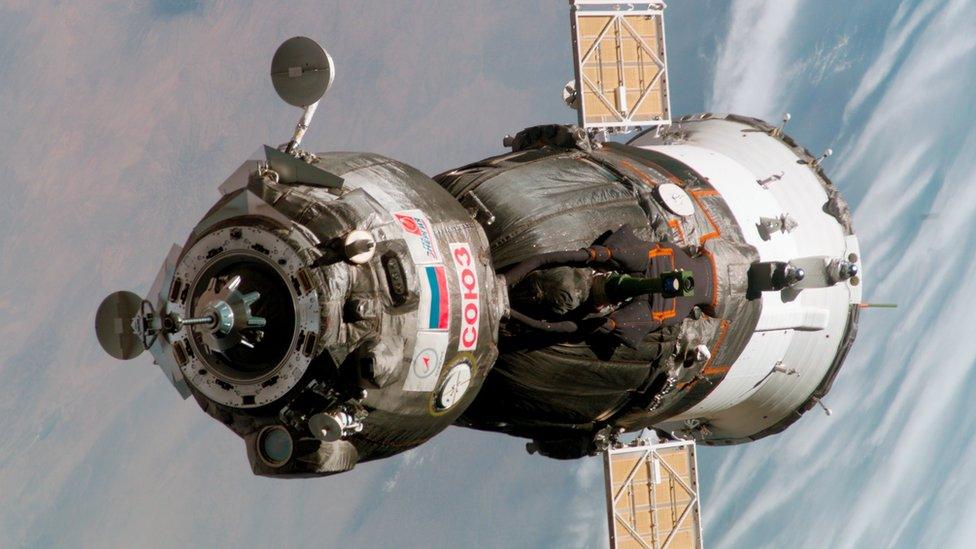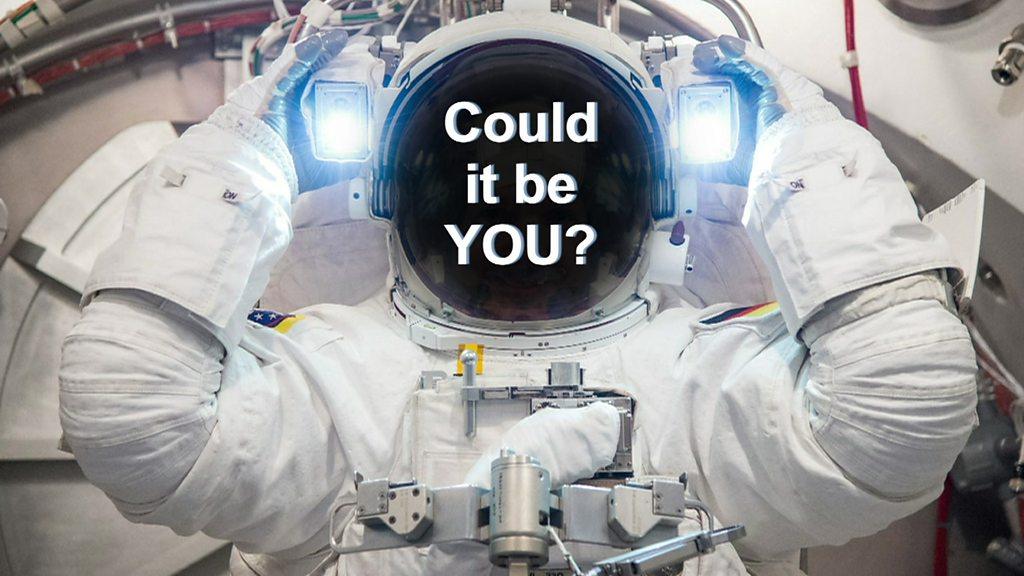Tim Peake: Spaceflight an 'inspirational' moment for UK
- Published

Helen Sharman visited the Mir space station in 1991
Astronaut Tim Peake's mission to the space station will be an "inspirational" moment for the whole of the UK, says Britain's first spacefarer.
Helen Sharman, who travelled to the Mir space station in 1991, told BBC News that everyone could share in the achievement.
"When it comes to sending a human, and when it comes to sending a human from our country… we feel it's tangible and it's ours," she said.
Mr Peake will lift off on a Russian rocket from Kazakhstan on 15 December.
Ms Sharman has high hopes for the mission and expects the profile of science in the UK to receive a major boost during the seven-month stay on the orbiting outpost.
BBC's special report page: Find out more about Tim Peake and his mission
"Everybody finds some aspect of human spaceflight interesting," she told me.
"This is going to be hugely inspirational. I have people coming up to me and saying they decided to study science because I came to their school and told them what it was like in space.
"They're now physics teachers, chemistry teachers, maths teachers, biology teachers and they're passing on the message to other people."

The BBC has had unique behind-the-scenes access to Tim Peake's training and launch. Follow his video diaries on BBC Two - Horizon Tim Peake Special- How to be an Astronaut and watch the launch live on BBC Two - Stargazing Live at 10:30 GMT on Tuesday 15 December. Then see him arrive on the International Space Station at 19:00 GMT the same evening on BBC Two in Stargazing Live: Brit In Space.

Flying the flag
After Mr Peake launches from Baikonur Cosmodrome next Tuesday, "there will be many thousands of young people who will decide that science is interesting because we've had a British astronaut flying".

Tim Peake has spent six years training for his trip to space
Twenty-four years ago, Ms Sharman became the first British citizen to fly into space as part of Project Juno, a venture sponsored by British private enterprise and the Soviet government. After hearing an advert on the car radio, the chemist applied and was selected from more than 13,000 applicants.
Speaking to me at Imperial College London, where she is operations manager, Ms Sharman said: "I never, ever imagined going into space when I was a kid. There was never an opportunity for somebody like me.
"I didn't even consider it until I heard the advert describing an opportunity for someone to go to Russia, train with the Soviet cosmonauts, learn about the spacecraft, learn about the science experiments, speak Russian. Combining all that with the physical training, that's when I realised it was what I wanted to do."
Recalling her flight, Ms Sharman said: "The day was really planned out for you. Mission control would send up a fax, a curly strip of paper and every five minutes there was an instruction for something I had to do. 'Wake up, get dressed, have breakfast, do this experiment, do that experiment, have a break'.
"Whenever you could take some time out up there where you feel in control, it was a good feeling. What we really liked to do was gather around one of the biggest windows we had up there and look out.
"We'd talk about what we could see, about our families and friends on Earth; and we'd look the other way and we could see millions of stars. No-one ever gets tired looking out of the window.
"I don't know whether it's because we have evolved on Earth, but everyone is attracted to it. No-one has ever come back from space saying, 'you know what, Earth was really ugly!'"
Like riding a bike
While many of their experiences will be similar, Ms Sharman's flight lasted a week, compared with the half a year Mr Peake will spend aboard the International Space Station (ISS).
"The training really is very good. Tim's trained for six years, he will know that spacecraft inside out… but what you can't prepare for is how you're going to feel. We do weightless training in aircraft, but it lasts for 23 seconds, which isn't enough for the body to adapt," she told me.
"Body fluids tend to go to the chest and head. During the first few hours and days in space, astronauts look puffy. Then the body loses what it sees as excess fluid and you start to feel normal again. You feel quite stuffed up, like you've got a heavy cold."
The experience aboard Mir is still vivid for Ms Sharman, who compares the experience of being weightless to riding a bike.
"Even though you're not on the bike, you never really forget what it's like, and weightlessness is the same.
"Twenty-four years later I can still remember what it feels what it's like to float in the air - to do a slow somersault and you just keep on turning until you stop yourself using the ropes on the walls of the space station."
Follow Paul on Twitter, external.
- Published16 June 2016

- Published7 December 2015

- Published9 December 2015
